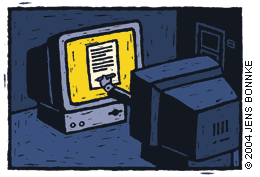
A new system replaces multiple plan-specific applications with one universal form.
Fam Pract Manag. 2004;11(5):24-25

Administrative hassles imposed by insurance companies have contributed to increased professional dissatisfaction for many family physicians. One redundant and time-consuming task has been the need to complete separate credentialing applications for each insurance plan with which a physician contracts. Fortunately, a new solution may ease some of the burden associated with the credentialing process.
Universal credentialing
To help streamline the credentialing submission process, the Council for Affordable Quality Healthcare (CAQH), a not-for-profit alliance of the nation’s leading health care plans and networks, has developed a single credentialing application and common application database. Instead of having to submit separate applications to each managed care organization, physicians can use the Universal Credentialing DataSource system to submit a “universal” credentialing application either electronically or in hard-copy format. The data from the completed application is housed in a central repository that can then be accessed by participating health plans authorized to do so by the physician. Currently, the Universal Credentialing DataSource system is “live” in 43 states and the District of Columbia. It is expected to be introduced in the remaining seven states (Oregon, Michigan, Nevada, Utah, New Mexico, Arkansas and Massachusetts) within the year.
How does it work?
Physicians in participating health plans automatically receive a Provider ID that gives them free access to the universal credentialing application online (for a list of these plans, see “Participating organizations”). Physicians who don’t automatically receive a Provider ID should contact the health plan or the CAQH help desk at 888-599-1771. It’s important to note that although participating health plans use the same application data to credential physicians, each retains its own standards for evaluating the information. Completing the application will take the average physician about two hours (slightly more time is required if the physician has been practicing for a long time). The system uses prompts to guide physicians through the application process and runs a comprehensive audit to check for errors once the application is complete. It is not necessary to complete the electronic application in one sitting. Physicians can begin to fill it out, save what they have completed and go back to it anytime.
After the initial application is submitted, regular maintenance of the data is all that’s required. Using their Provider ID, physicians can update their information online or by fax at any time. The system also automatically notifies physicians once each quarter to confirm that the data on file is complete and accurate. CAQH’s Practice Administrator’s Module (https://caqh.geoaccess.com/pmm) makes the data entry task much easier for office managers or clinic administrators whose responsibilities include gathering credentialing information.
PARTICIPATING ORGANIZATIONS
The following organizations are currently participating in the Council for Affordable Quality Healthcare's Universal Credentialing DataSource:
| Aetna |
| Anthem Blue Cross and Blue Shield |
| AultCare |
| Blue Cross Blue Shield of Georgia |
| Blue Cross Blue Shield of Kansas City |
| Blue Cross Blue Shield of Michigan |
| Blue Cross Blue Shield of Missouri |
| Blue Cross Blue Shield of North Carolina |
| Blue Cross of California |
| CareFirst BlueCross BlueShield |
| CIGNA HealthCare |
| Community Care Physicians |
| Culpeper PHO |
| Empire HealthChoice |
| Excellus Health Plans |
| The First Health Network / CCN Network |
| Great-West HealthCare / One Health Plan |
| HealthLink |
| Health Net |
| Horizon Blue Cross Blue Shield of New Jersey |
| Kaiser Foundation Health Plan of The Mid-Atlantic States |
| MAMSI Health Plans |
| MultiPlan |
| Oxford Health Plans |
| Preferred Care |
| Rocky Mountain Health Plans |
| Sentara Healthcare |
| UNICARE |
| Univera |
| Virginia Premier |
Is it secure?
The Universal Credentialing DataSource database is housed in a secure data center maintained by the CAQH, and no one can access a physician’s information unless he or she has previously authorized it. Electronic signatures are required for Internet access and all online information exchanges are automatically encrypted using 128-bit Secure Socket Layer encryption. More detailed information on the security features of the application can be found at the CAQH Web site.
A caveat
Because only a fraction of the nation’s health care organizations are currently participating in the CAQH program, not all physicians will be able to benefit from this streamlined credentialing process. But all indications are that the number of plans participating in this program will grow. The universal credentialing application is an idea whose time has come. It’s free, saves time and paperwork hassles, and gives physicians more time to concentrate on what’s most important: their patients.